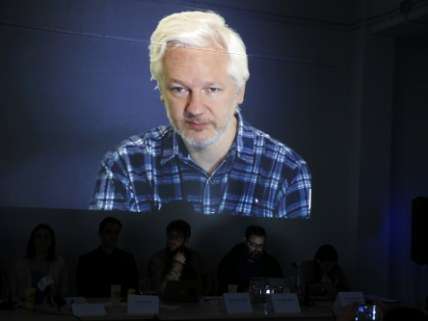If President Trump's War on the Press Starts with WikiLeaks, Who Will Rise to Assange's Defense?
Look down and take note of the very obvious slippery slope.

If a vague, politically malleable concept of "hate speech" is all it takes for some Americans to surrender their First Amendment rights to speak out, will the possibility of the prosecution of WikiLeaks be all it takes for some Americans to turn their backs on the free press?
CIA Director Mike Pompeo warned last week that neither WikiLeaks nor its founder Julian Assange were safe from what Pompeo believes to be "justice" for the media outlet's role in leaking classified or private information and communications to the public.
If the sources who have talked to CNN are telling the truth, Pompeo's threats aren't just bluster: The Department of Justice is mulling over whether to charge Assange with some sort of criminal behavior. And Attorney General Jeff Sessions said on Thursday that the Justice Department will "seek to put some people in jail" over leaks.
President Barack Obama's administration famously went after leakers. But they knew to target the people who actually leaked to the press, not the press itself. CNN notes that the Justice Department under Obama did mull over how to possibly get at Assange and WikiLeaks but couldn't figure out a way to do so without implicating other media outlets that also ran leaked classified information.
Under Donald Trump's administration, they seem to be less interested in that sort of distinction and are leaning heavily on the idea that Assange is a foreigner and doesn't get the "protection" of the First Amendment. That's not how the First Amendment works or is written and the American Civil Liberties Union is raising alarms at what the administration is considering:
Ben Wizner, director of the American Civil Liberties Union's Speech, Privacy and Technology Project, argued that US prosecution of Assange sets a dangerous precedent.
"Never in the history of this country has a publisher been prosecuted for presenting truthful information to the public," Wizner told CNN. "Any prosecution of WikiLeaks for publishing government secrets would set a dangerous precedent that the Trump administration would surely use to target other news organizations."
A lot of people who supported Hillary Clinton are furious with WikiLeaks these days and blame it and Assange for contributing to her defeat by publishing hacked emails from her campaign. Some even believe Assange is a willing stooge for the Russian government. As such, because some people don't like the consequences of what WikiLeaks has done, they seem more than fine with the idea that they should not have the same protections as media outlets they see as more "mainstream." Note some of the tweets at the bottom of this San Diego Union-Tribune piece. I think I'm most fascinated with the dueling concepts that Assange isn't protected by the First Amendment because he's a foreigner, but he's also a "traitor," even though he's not a U.S. citizen.
Allow the government to decide what is a real media outlet and what counts as journalism will only lead to bad places. It is the ultimate example of a slippery slope that decimates the concept of what a "free press" is. Sessions subsequently on CNN refused to rule out the possibility that other media outlets could also face prosecutions for publishing leaked information.
People who think WikiLeaks and Assange are bad guys because of what happened to Clinton need to stop for a minute and think about the consequences of an administration led by a man who is openly hostile to the concept of a free press claiming the authority to decide the circumstances by which the protections of the First Amendment applies. That so many people hate WikiLeaks makes it an easy political target. This is a test run. It will not stop here.
